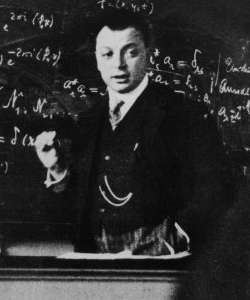|
home | what's new | other sites | contact | about |
||
|
Word Gems exploring self-realization, sacred personhood, and full humanity
Quantum Mechanics
return to "Quantum Mechanics" main-page
Austrian physicist Wolfgang Pauli (1900-1958)
Wikipedia: In quantum mechanics, the Pauli exclusion principle states that two or more identical particles with half-integer spins (i.e. fermions) cannot occupy the same quantum state within a quantum system simultaneously... In the case of electrons in atoms, it can be stated as follows: it is impossible for two electrons of a poly-electron atom to have the same values of the four quantum numbers. Editor’s note: What does this mean? As I’ve gathered from several sources, these “four quantum numbers” represent four different characteristics of the electron. Pauli said that at least two of them need to be different. In this difference, the resultant forces tend to be self-cancelling. Why this need for a cancelling of forces? Without this, it seems, an atom’s electrons would fall toward the lowest energy levels; matter, apparently, would implode; chemistry, and life itself, would not be possible on planet Earth.
Wikipedia footnote: Werner Heisenberg [in Physics and Beyond, 1971] recollects a friendly conversation among young participants at the 1927 Solvay Conference, about Einstein and Planck's views on religion. Wolfgang Pauli, Heisenberg, and Dirac took part in it. Dirac's contribution was a poignant and clear criticism of the political manipulation of religion, that was much appreciated for its lucidity by Bohr, when Heisenberg reported it to him later. Among other things, Dirac said: "I cannot understand why we idle discussing religion. If we are honest – and as scientists honesty is our precise duty – we cannot help but admit that any religion is a pack of false statements, deprived of any real foundation. The very idea of God is a product of human imagination. [ ... ] I do not recognize any religious myth, at least because they contradict one another. [ ... ]" Heisenberg's view was tolerant. Pauli had kept silent, after some initial remarks. But when finally he was asked for his opinion, jokingly he said: "Well, I'd say that also our friend Dirac has got a religion and the first commandment of this religion is 'God does not exist and Paul Dirac is his prophet'". Everybody burst into laughter, including Dirac.
|
||
|
|
